Kak’Ik, Guatemalan Turkey Soup
November 25, 2019 | Updated June 15, 2020
As an Amazon Associate I earn from qualifying purchases.
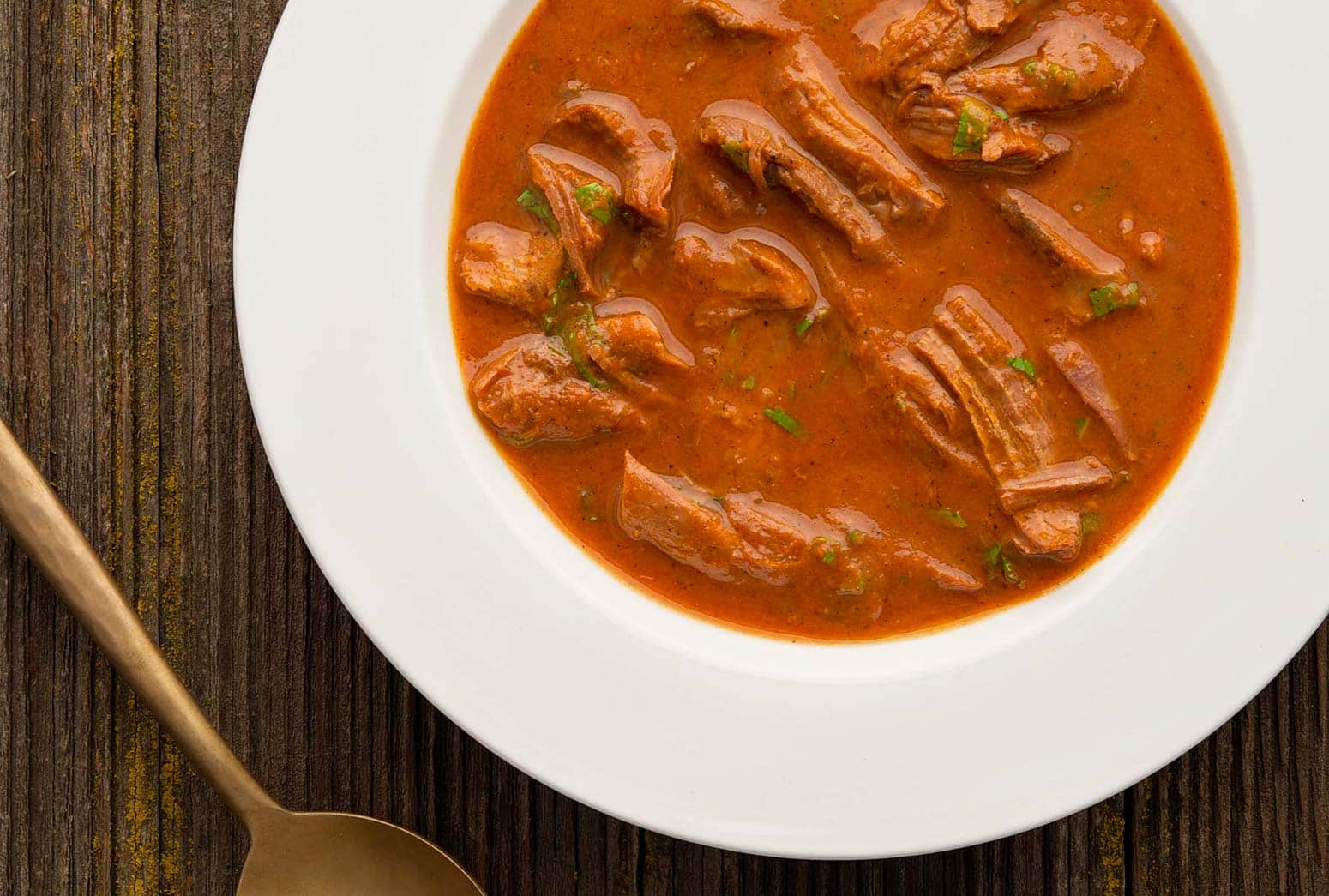
This Guatemalan turkey soup is another of those dishes where everyone’s version is slightly different, and arguments arise from minor differences. Think gumbo, chili, goulash or spaghetti sauce and you get the idea.
It’s called kak’ik in Mayan, which basically means “red and spicy.” It is indeed very red, but it’s not terribly spicy, unless you want it to be. Kak’ik is arguably the national dish of Guatemala, and versions of it have been made long before the Spaniards showed up.
What makes this turkey soup distinctive are a few set ingredients:
- Turkey, for one. Use a wild turkey or a heritage breed if you can, because the Guatemalan birds are very different from a typical supermarket turkey in the United States. That said, regular store-bought will be OK.
- Garlic and onions, and lots of them. Use white onions if you can.
- Tomatoes and tomatillos. Always more tomatoes than tomatillos by volume; the tomatillos are there primarily to add tartness.
- Chiles of some sort. I’ve seen recipes in Spanish with no chiles, with a few, and with lots. My take is to use a few to help with flavor and color, but don’t overdo it.
- Achiote or annatto. Essential. You don’t need much, and the Maya grind pure annatto, and if you can get that use it. Otherwise use a little achiote paste from a Latin market.
- Herbs, almost always mint and, if you want to go real-deal, culantro. Culantro is native to the Americas and tastes like cilantro — this is why you see cilantro so often in Latin cuisine; it’s like the native culantro, only easier to grow. Obviously cilantro is fine.
Beyond that, you absolutely want to char a lot of your vegetables, either under a broiler or on a comal (or dry cast iron pan). Like the Mexican stew chocolomo, one of my favorites, char is a key flavor here.
And, you want things to simmer a long time. This is an easy soup, but not a quick one.
In Guatemala, kak’ik is served with either white rice or small tamales made with white corn. Just simple tamales, masa only, no filling. Basically it’s the starch that goes with the soup. Interestingly, the Maya, historically, were never too keen on tortillas — that’s an Aztec thing — but they still make a dizzying array of tamales.
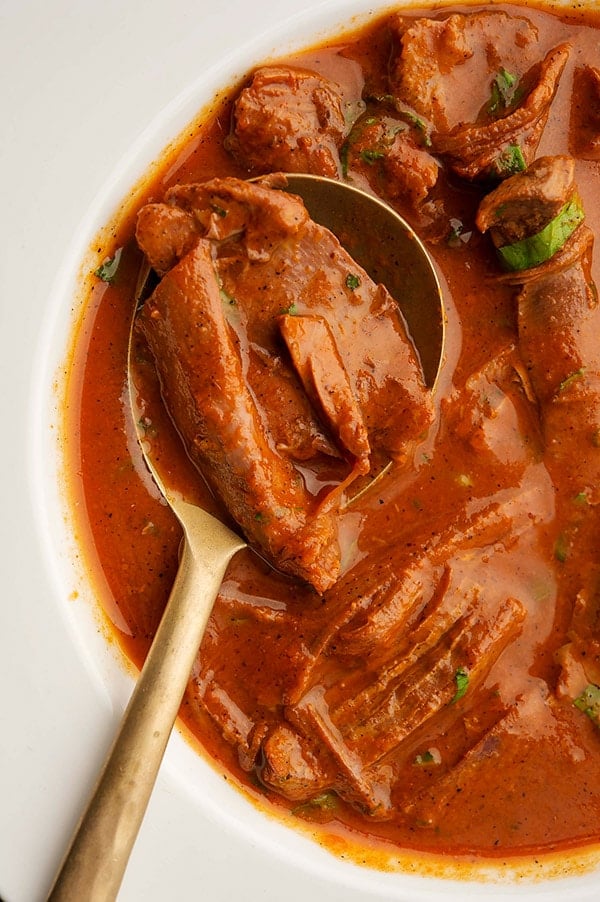
I’d make these tamalitos, as small tamales are called, but I reckon why bother when rice is as good and takes a third of the time to cook, let alone prep? Some eat their turkey soup alongside tortillas, too.
Oh, and you want a little bowl of fiery dried or fresh little chiles, too. I suggest chiltepin or chile pequin, which are easy to find. But hot sauce will work just fine.
Kak Ik, Guatemalan Turkey Soup
Ingredients
TURKEY
- 2 turkey legs, thighs and drumsticks
- 1 quart turkey or chicken broth
- Salt
SAUCE
- 6 plum tomatoes, sliced in half
- 6 large tomatillos, husked and sliced in half
- 2 dried guajillo chiles
- 1 white onion, peeled and quartered
- 2 heads garlic, cloves separated but unpeeled
- 2 tablespoons achiote paste
TO FINISH
- 1/2 cup minced fresh mint
- 1/2 cup minced fresh culantro or cilantro
- masa to thicken soup (optional)
Instructions
- Simmer the turkey. Put the turkey legs in a large pot with the broth, and add enough water to cover everything by 2 inches. Bring to a simmer and cook, partially covered, until the turkey is tender, anywhere from 90 minutes to 3 hours depending on the age of the bird.
- Meanwhile, make the sauce for the soup. Put the halved tomatoes, quartered onion, garlic cloves and tomatillos, cut side up, on a baking sheet and broil until partially blackened, about 15 minutes. Keep an eye on them so they don't completely incinerate.
- Open the dried chiles and remove the seeds and stems. Pour boiling water over them in a small bowl to rehydrate while the other vegetables are charring.
- When the vegetables are nicely charred, remove the baking sheet from the oven and, when it's cool enough to handle, peel all the garlic; keeping the skins on in this process prevents the cloves for carbonizing. Put all the sauce ingredients into a blender and puree.
- Pick all the meat off the turkey legs and reserve. Strain the broth; I do this by setting a fine-meshed sieve over a big bowl. No need to clarify it in this soup. Wipe out your soup bowl and add back the shredded turkey, the strained broth and the contents of the blender bowl. Tip: save back some broth to rinse out every bit of goodness from within the blender bowl. Bring all this to a simmer and let it cook 15 minutes.
- When you are ready to serve, stir in the minced herbs and add masa to thicken if you want. Don't add more than a tablespoon at a time, and stir it in well. Serve with rice, little masa dumplings or tortillas.
Notes
Nutrition
Nutrition information is automatically calculated, so should only be used as an approximation.
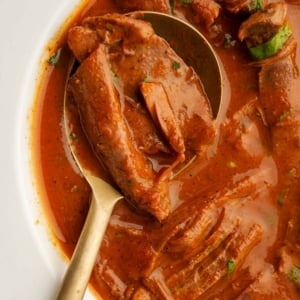

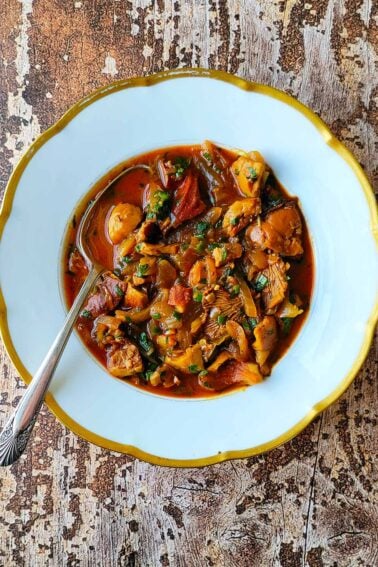
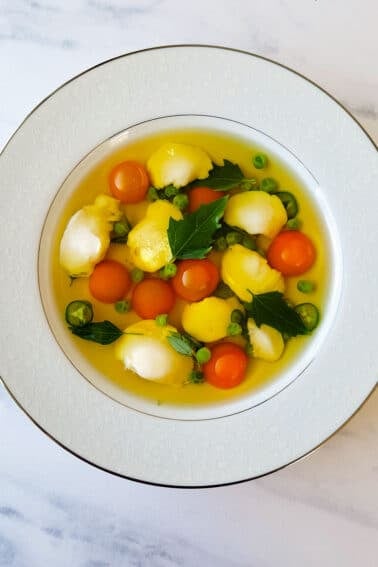

This recipe is invaluable – the soup has an incredible depth of flavor and is perfectly balanced with salt, acid, and heat. I have eaten kak’ik in Guatemala but it was 15 years ago and honestly I don’t remember what it tasted like but it doesn’t matter now because I have this recipe. I made it the day after Thanksgiving for my family with broth using one of our turkey carcasses. I make my broth pretty concentrated and salty (using an instant pot) so that may have boosted the yumminess of the soup. I added extra guajillo chilis (we like spicy) and just used leftover dark meat from the Thanksgiving turkey, which was delicious and cut down on cooking time. Since we had a second turkey I made the kak’ik again for my friend group’s monthly soup Sunday gathering – a double batch this time. Everyone raved about it. I brought a quart of leftover soup to my boss and the next day his wife came in to tell me how good it was. Thanks for the job security, Hank!
Mr. Shaw: I’m making a Guatemala-themed special dinner for my wife. I’ve already prepared chirmol, guacamol, frijoles volteados, and blue corn tortillas as appetizers/sides. I want your kak’ik to be the star of the show. However, the butcher only had turkey tenderloin, no turkey drumsticks or thighs. Any suggestions for preparing the loin for your stew? Cut it up into bite-sized pieces? Brown it first? Any suggestions would very much be appreciated. Thanks for the excellent recipe.
TR: Hmmm… I’d cut it into bite sized pieces and only cook it about 15 to 20 minutes in the soup.
Thank you for the response. As you were so kind to reply and share your advice I wanted to share some feedback. The dinner went well–your soup recipe is delicious and she LOVED it. I cut the tenderloin into pieces and only cooked it for a short time as you suggested. However, I do not recommend using loin even if, like me, you have no other choice. It was too lean and firm for the recipe. So, what we did is remove the now-well flavored loin pieces and served it in a later meal with rice (wonderful and delicious). We saved the rest of the soup, finally got a turkey drumstick, and used the finished soup to braise it low and slow–it was excellent. Thanks again for the great recipe and helpful advice.
Wow! Being Guatemalan I am amazed by your great interpretation of our Kak-ik.
Celia: Thank you so much! I read a bunch of recipes in Spanish, and that helped a lot.
This is my go to turkey recipe, it’s popular with the whole family. I spice it up a bit but it’s really good cooked as listed as well.
Hi. I’ll make this today and can’t wait, I have chile cobanero I brought to England from Guatemala ? just one question though, is it really 2 whole heads of garlic in there, it seems like a lot, does it not overpower the taste? Thanks
Marynes: Yes, remember they are roasted, so that mellows them out a lot. It would be pretty strong if they were in there only sautéed or raw.
Made this using leftovers, at first my kids railed against the thought of MORE turkey, and MORE soups. Then they tried it. I let them help make it of course, it was a total success! Ours was fairly mild but still Central American in flavor. I’ll tell you we had no leftovers of this dish! Delicious!
Achoite paste is sold at most Mexican Stores, and you can also pick up the other ingrediants.
I tried the recipe but could not find any achiote and used as a substitute 1 1/2 T of hot paprika 1/2 tsp cumin 3/4 tsp oregano and 1 T of white vinegar to make the paste. The result was delicious!
Interestingly, the Maya, historically, were never too keen on tortillas — that’s an Aztec thing — but they still make a dizzying array of tamales.
My experience with Guatemalan home cooking in the Verapaces is that tortillas were found at every meal, along with beans and coffee. Tortillas in Guatemala were rather different from the tortillas found in supermarkets and restaurants in the US, which I assume are fairly similar to those found in Mexican stores and restaurants.
Tortillas in Guatemala- at least the homemade variety- were much thicker than the paper-thin corn tortillas in the US. In addition, Guatemalan tortillas actually tasted like corn. Guatemalan tortillas spoil you.
Gringo: Interesting to hear your experience. My statement about tortillas vs. tamales is probably more historical. Lots of anthropologists and archaeologists have noted the tamal/tortilla split in these two cultures. Did not know it had blended so much, but there ya go. Thanks!
It’s called kak’ik in Mayan
Glad to see someone writing about kak’ik. It is a traditional Christmas meal in the Verapaces (Alta and Baja- upper and lower). My helping to prepare some of those Verapaz Christmas feasts was limited to fetching banana leaves for Christmas tamales. I let someone else kill the turkey. Christmas tamales in Guatemala are more elaborate than the sell-by-the-dozen variety found in the US- plums or raisins are used in Christmas tamales.
Cobaneros are the chiles used in Guatemala for kak’ik. They are hot and smoky- due to being dried over smoke. Not having access to Cobaneros in the US, I find other dried, smoky chiles sold here, such as moritas or chipotles, to be good substitutes. Like you said, don’t overdo- though cilantro/culantro can absorb a lot of heat.
There are some 20 Mayan languages in Guatemala. Kak’ik comes from the Mayan language known as Q?eqchi?, which is spoken mostly in Alta and Baja Verapaz, and El Petén ( jungle). The people speaking Q?eqchi?/Kekchi do not identify their language as Mayan per se, but as Q?eqchi?/Kekchi .
Made this with leftover bird from thanksgiving and served it to the whole family (kids included) after football. Big hit.
Had no tomatillos, so we hit it with a squeeze of lime just before serving.
Quick note: The recipe doesn’t mention when to add the achiote/annato so it went in the broth at the same time as the charred vegetables.
Question- skin in or off the meat when adding to broth?
Rebecca: Either works.
Gonna try this recipe for our Anti-traditional Friendsgiving, however I am going to sub duck for turkey! I will report back after the yumminess has happened!
Muy buena sopa!
I did not have achiote paste so subbed achiote powder. Also used Penzey’s Roasted Garlic powder because to my horror! I was out of fresh garlic. Yummy!
Buying a prepared achiote paste from a Latino Mercado with some turnover of spices will really save you from the trials of trying to grind annato seeds. Those buggers are really hard and will easily break your coffee mill shatter grinder.
A typical Mayan Recado Rojo Achiote paste mix has 9 ingredients or more. Here is one well regarded mix and it does have a a lot of extra flavor compared to plain annato seeds which are almost tasteless and used to color cheddar cheese naturally stateside. Of course Mayan women would blend and prepare their own custom recado’s with a blend of herbs and spices including some native to a small region where they live and not sold commercially. David Sterling’s book “Yucatán Recipes from a Culinary Expedition” is a great resource on this exotic regional cooking but many Maya live in highland forests of Belize and Guatemala and do things very differently than Yucateco Mayans.
Ingredients
1 1/2 tablespoons achiote seeds
1/2 tablespoon coriander seeds
1/2 tablespoon black peppercorns
1/2 teaspoon cumin seeds
3 whole cloves
2 teaspoons dried oregano
5 cloves garlic
1 teaspoon salt
1-2 tablespoons white wine vinegar, or Seville orange juice
If using annatto, what is your suggested amount?
Joe: Just a couple teaspoons.
Hi, Thanks for this recipe! Looks great. Is anyone else getting ads (Citibank, Stop n Shop) that annoyingly pop up surrounding Hank’s article, obscuring part of it and then disappearing and reappearing repeatedly. Driving me crazy as I try to read on iPhone?
I appreciate the effort. A few ingredients are missing and the recepie is over simplified, you skipped a couple of key steps that give this dish it’s flavor. Also you missed the fact that this is a traditional recado, which is better compared to a smooth stew. I dislike the fact that you want to categorize it as a soup.
Lilianna: I am sorry you don’t like it, but this is a recipe I learned from a Guatemalan, and in my research, I have seen many variations. Yours just must be more complex than mine.
Lilianna, you need an attitude adjustment and reality check. This might look like stew to you and me, but Hank “categorized” this Kak’ik recipe correctly because ‘when in Guatemala do as the Guatemalans do’ – and they call it soup! They also have naming rights. And this definitely ain’t your grandma’s leftover turkey stew…